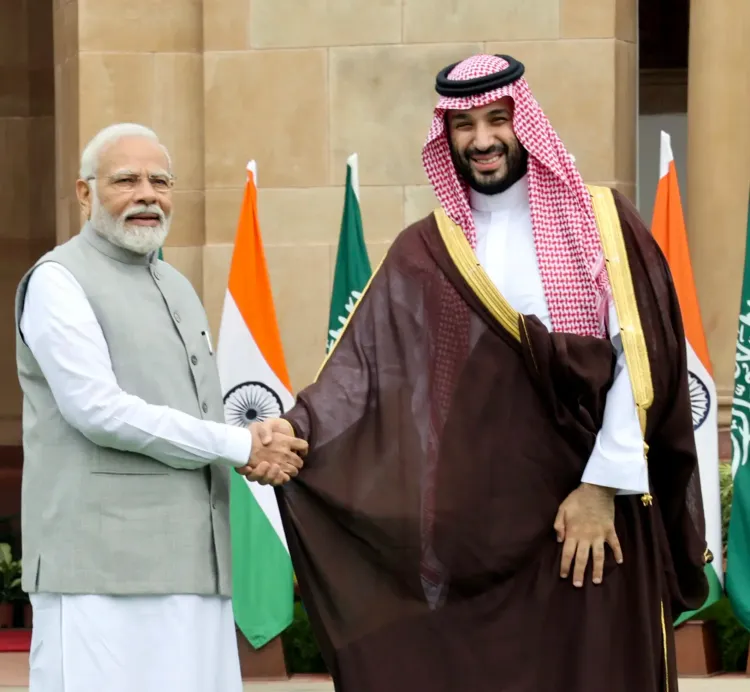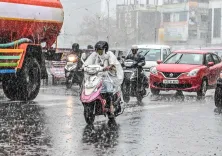Strengthening India-Saudi Arabia Ties: PM Modi's Upcoming Visit to Riyadh

Synopsis
Key Takeaways
- PM Modi's visit to Saudi Arabia is scheduled for April 22-23.
- India and Saudi Arabia established diplomatic relations in 1947, elevating ties to a Strategic Partnership in 2010.
- The partnership has expanded significantly in the last decade.
- Economic ties: India is Saudi Arabia's second-largest trade partner.
- Indian diaspora plays a crucial role in bilateral relations.
New Delhi, April 19 (NationPress) India and Saudi Arabia are poised to enhance their diverse partnership during Prime Minister Narendra Modi's two-day visit to the Kingdom, which is scheduled for next week.
The visit on April 22-23, extended by Saudi Crown Prince and Prime Minister Mohammed bin Salman, marks PM Modi's third trip to the Kingdom following his earlier visits in 2016 and 2019. This trip comes in the wake of Prince Mohammed bin Salman's State Visit to New Delhi in September 2023 for the G20 Summit and the inaugural meeting of the India-Saudi Arabia Strategic Partnership Council.
“India and Saudi Arabia enjoy close and amicable relations, backed by a rich history of socio-cultural and trade interactions. As strategic allies, both nations maintain robust bilateral connections across various sectors including political, defence, security, trade, investment, energy, technology, health, education, culture, and people-to-people interactions,” stated a release from the Ministry of External Affairs (MEA).
“India's relationship with the Kingdom has developed into a more resilient and lasting partnership over the past decade, extending into numerous strategic areas, marked by increasing investment commitments, the expansion of defence collaboration, and vigorous high-level exchanges across multiple domains,” it continued.
The MEA emphasized that PM Modi's visit underscores India's commitment to its bilateral rapport with Saudi Arabia and will serve as a platform for further deepening and strengthening the multifaceted partnership, along with facilitating discussions on various regional and global issues of shared concern.
With the guiding principle of 'Neighbourhood First' central to the Modi government's foreign policy, the Prime Minister has previously highlighted the significance of India's relations with Saudi Arabia as one of the most pivotal bilateral partnerships in the extended neighbourhood.
India and Saudi Arabia initiated diplomatic relations in 1947, and in 2010, the bilateral partnership was elevated to a Strategic Partnership.
Nevertheless, this collaboration has gained significant momentum over the last decade, particularly following PM Modi's landmark visit to Riyadh in April 2016, which catalyzed comprehensive cooperation in the realms of politics, economy, security, and defence. During this visit, King Salman bestowed the Kingdom's highest civilian accolade, the 'King Abdulaziz Sash', upon PM Modi.
During PM Modi's State visit to Saudi Arabia in October 2019, both countries agreed to form a Strategic Partnership Council (SPC) to guide the India-Saudi Arabia relationship.
The SPC is structured around two pillars - the Political-Security-Socio-Cultural (PSSC) and Economic and Investment. The PSSC is co-chaired by the External Affairs Minister and the Saudi Foreign Minister, while the economic pillar is jointly led by India's Commerce and Industry Minister and the Saudi Energy Minister.
Additionally, there are eight Joint Working Groups (JWGs) and sub-committees under these two pillars, conducting regular official-level meetings.
The inaugural Summit of the SPC took place in New Delhi in September 2023 and was co-chaired by PM Modi and visiting Crown Prince Mohammed bin Salman.
Starting in 2024, there have been 11 ministerial-level visits between both nations. The Saudi Foreign Minister and the Saudi Minister of Industry and Mineral Resources visited India in November 2024 and February 2025, respectively.
Riyadh also serves as the headquarters of the Gulf Cooperation Council (GCC), with India maintaining positive relations and consistent dialogues with the GCC Secretariat. In September 2024, EAM S. Jaishankar visited Riyadh to co-chair the inaugural India-GCC Ministerial Meeting.
On the economic front, Saudi Arabia ranks as India's fifth largest trade partner, while India is the second largest trade partner for Saudi Arabia. In the Financial Year 2023-24, India's imports from Saudi Arabia totaled US $31.42 billion, with exports amounting to US $11.56 billion.
Key exports from India to Saudi Arabia encompass engineering goods, rice, petroleum products, chemicals, textiles, food products, ceramic tiles, while major imports for India from Saudi Arabia include crude oil, LPG, fertilizers, chemicals, and plastic products, among others.
The total Saudi investment in India, including that from the Public Investment Fund (PIF), other Saudi enterprises, and the Saudi-backed Vision Fund, has reached approximately USD 10 billion. Significant investments feature PIF's stake in Reliance Jio Platforms, Reliance Retail Ventures Limited, Oyo Hotels, and Healthtech Healthifyme. Furthermore, the Saudi Agricultural and Livestock Investment Company (SALIC) has acquired interests in Daawat Foods Limited, while SABIC has invested over USD 100 million in its technology and innovation center in Bengaluru.
Notable Saudi investors in India include ARAMCO, Zamil Group, Al Fanar, and Petromin. Indian investments in Saudi Arabia have also surged in recent years, reaching around USD 3 billion by August 2023, covering diverse sectors such as management and consultancy services, construction, telecommunications, IT, financial services, software development, and pharmaceuticals. Numerous Indian corporations like L&T, TATA, Wipro, TCS, TCIL, Shapoorji and Pallonji, Air India, Go Air, Indigo, and SpiceJet have established a strong presence in Saudi Arabia.
Saudi Arabia remains India's third largest source of crude oil and petroleum products for the Financial Year (FY) 2023-24, with India importing 33.35 MMT of crude oil, constituting 14.3 percent of India's total crude oil imports. In FY 2023-24, Saudi Arabia was also the third largest supplier of LPG to India, accounting for 18.2 percent of India's total LPG imports. Additionally, Saudi Arabia ranks as a primary supplier of fertilizers, being the second largest source of DAP for India.
On the diaspora front, the Indian community in Saudi Arabia comprises 2.7 million individuals, acting as a living link between the two nations. The contribution of the Indian diaspora to Saudi Arabia's economic growth is well acknowledged, with the number of Indians in Saudi Arabia steadily increasing. Over the past year, approximately one lakh Indians have migrated to Saudi Arabia for employment.
The annual Haj pilgrimage and Umrah also represent a vital element of India-Saudi bilateral relations, with India's Haj quota set at 175,025 pilgrims.







